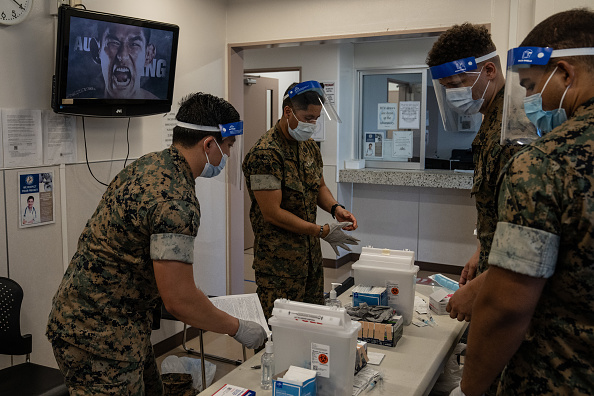The U.S. Department of Defense (DoD) no longer requires all service members to get COVID-19 shots.
Secretary of Defense (SoD) Lloyd Austin made the policy official in a memo released on January 10. The 2023 National Defense Authorization Act (NDAA) required Austin to rescind the mandate, which was issued on August 24, 2021.
The memo states no military members will be discharged “solely” for refusing the shots “if they sought an accommodation on religious, administrative, or medical grounds.” Austin stated the military will remove any disciplinary actions taken against individuals still in the military, such as letters of reprimand.
However, the careers of objecting service members could still be affected, according to Austin’s memo.
“Other standing Departmental policies, procedures, and processes regarding immunizations remain in effect,” states Austin’s memo. “These include the ability of commanders to consider, as appropriate, the individual immunization status of personnel in making deployment, assignment, and other operational decisions, including when vaccination is required for travel to, or entry into, a foreign nation.”
‘Fusillade of Challenges’
Austin’s memo states individuals who were discharged must petition their former service to change their discharge record, but he must do more, says Sen. Ron Johnson (R-WI), who led the charge against the military’s COVID-19 vaccine policy.
“Now @SecDef needs to take every step necessary to undo the harm done to service members and their families when they were forcibly discharged, ” tweeted Johnson.
Austin did not rescind the mandate voluntarily, says Doug Seaton, president and general counsel of Upper Midwest Law Center, a firm that has represented employees facing COVID-19 vaccine orders.
“The SoD’s rescission of the DoD’s Armed Forces’ COVID vaccination mandate, along with the reprehensible practice of ignoring and denying legitimate exemption applications, is very welcome,” said Seaton. “But it is also long overdue, and only comes after a fusillade of challenges from service members, veterans’ organizations, and political leaders, among whom Sen. Ron Johnson deserves particular mention, and court cases.”
Vaccine Injury Inquiries
On his website, Johnson said his investigation into vaccine injuries of military members will continue.
Johnson released a copy of a letter he sent to Lt. Gen Ronald Place, director of the Defense Health Agency, on December 22, requesting detailed information on claims filed by active-duty service members for a wide range of health diagnoses, including COVID-19.
“The brave men and women who serve our country deserve to know the truth about the short and long-term health effects these mandated vaccines will have on the rest of their lives,” wrote Johnson.
‘Make Them Whole’
Seaton says there also needs to be an investigation as to why the mandate was put in place and why the military refused requests for exceptions.
“Even allowing for initial caution and uncertainty about COVID and the vaccines, this mandate, and certainly the exemption denial practice, should clearly have been seen to be unjustified more than a year ago,” said Seaton.
The NDAA does not require the military to accept back those who were discharged, says Seaton.
“There should be an effort to reinstate service members who suffered under this mandate and make them whole,” said Seaton. “There should also be an inquiry into the sources of this mandate because I am afraid, we will then find, not a sober assessment of medical issues by the DoD, but something akin to the strong-arming and lobbying we saw in the Department of Justice’s infamous directive on parents as terrorists or the Twitter emails exposé of the censoring of critical voices on vaccine policy by White House officials.”
Private Sector Impact
Health care professionals who worked for private organizations and were also denied exemptions from vaccine mandates reached a $10 million-plus settlement with one health care system in August.
Other private sector workers were also denied exemptions, says Seaton.
“At the Upper Midwest Law Center, we are litigating numerous cases of unlawful religious vaccine exemption denials against several employers, including a number of cases against the Minneapolis Federal Reserve, which also recently rescinded its vaccine mandate, without offering reinstatement to those adversely affected,” said Seaton. “We hope the DoD’s action will reinforce our efforts to win redress for these clients and others similarly affected.”
AnneMarie Schieber (amschieber@heartland.org) is the managing editor of Health Care News.





















